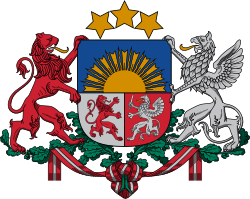Background
President Valdis Zatlers called the referendum under the power given to him by the constitution on 28 May 2011. [2] Zatlers called the referendum in response to the Saeima's refusal to sanction a search at the home of MP Ainārs Šlesers, leader of Latvia's First Party/Latvian Way and a former cabinet minister. [3] According to the current legal procedure, the referendum on the Saeima's dissolution had to take place no later than two months after the President's decree. [4]
The Constitution of Latvia foresaw that if the people had not supported Zatlers' decision, he would have had to resign from the presidency. This could have created a judicial conundrum, however, since Zatlers' current term expired on 7 July and the Saeima held a presidential election (in which Zatlers was also a candidate) on 2 June. [5] As Zatlers was not reelected, however, this conundrum was avoided.
This page is based on this
Wikipedia article Text is available under the
CC BY-SA 4.0 license; additional terms may apply.
Images, videos and audio are available under their respective licenses.
